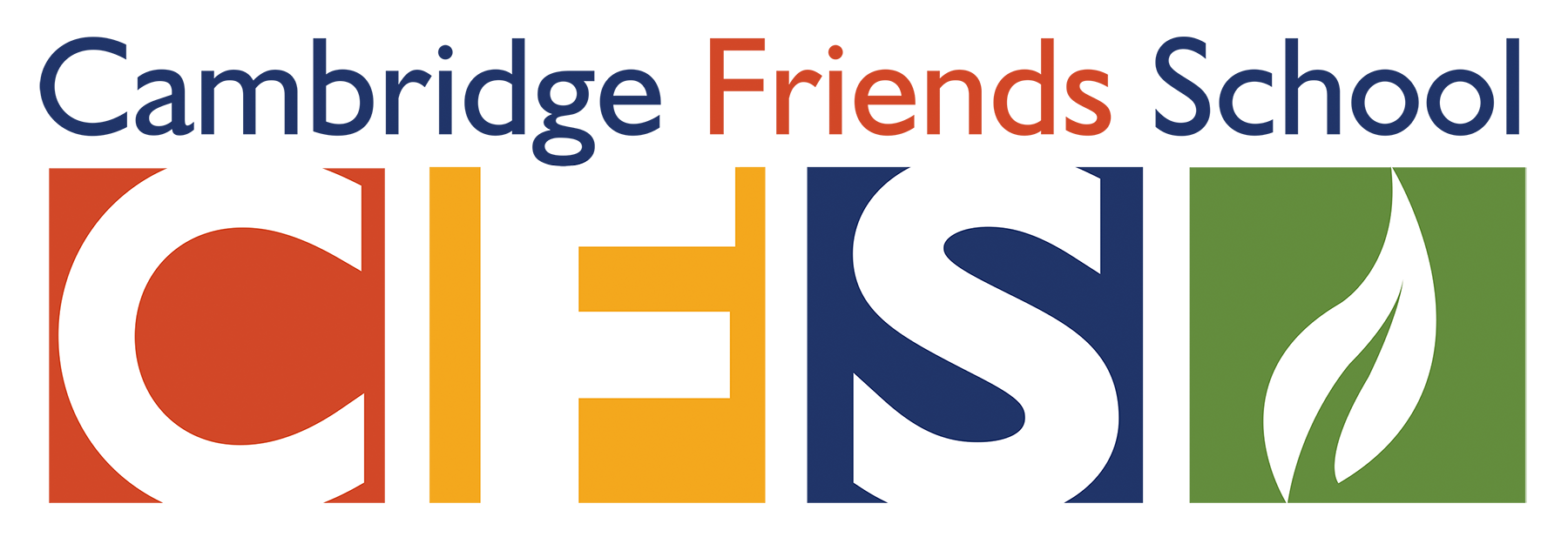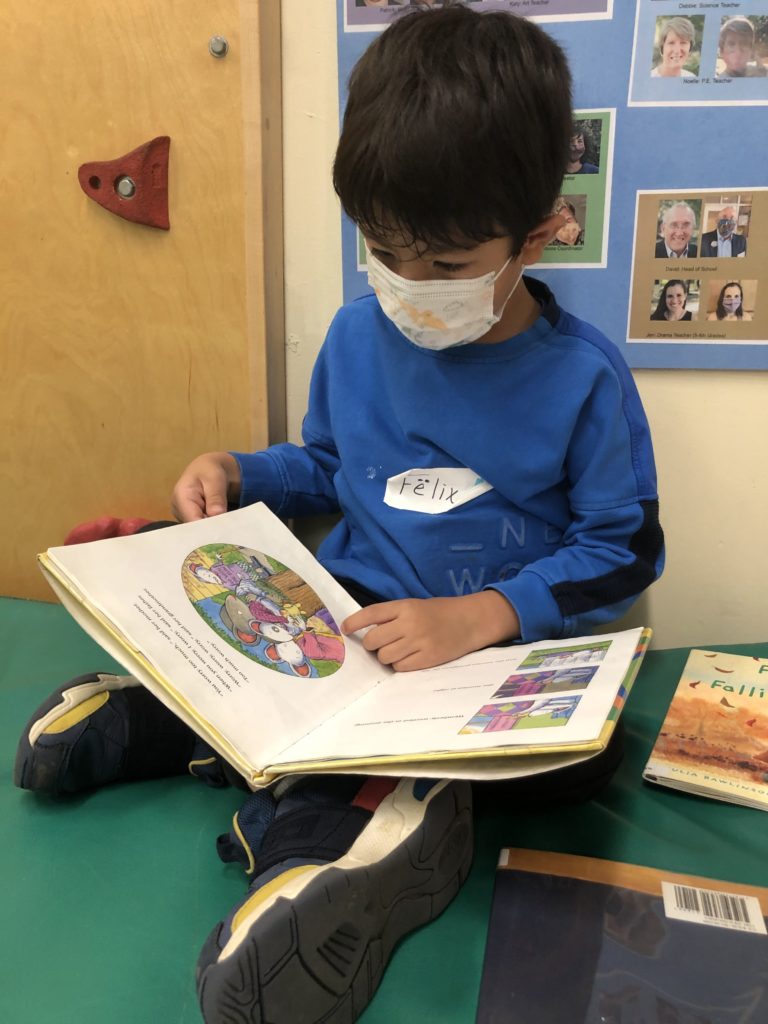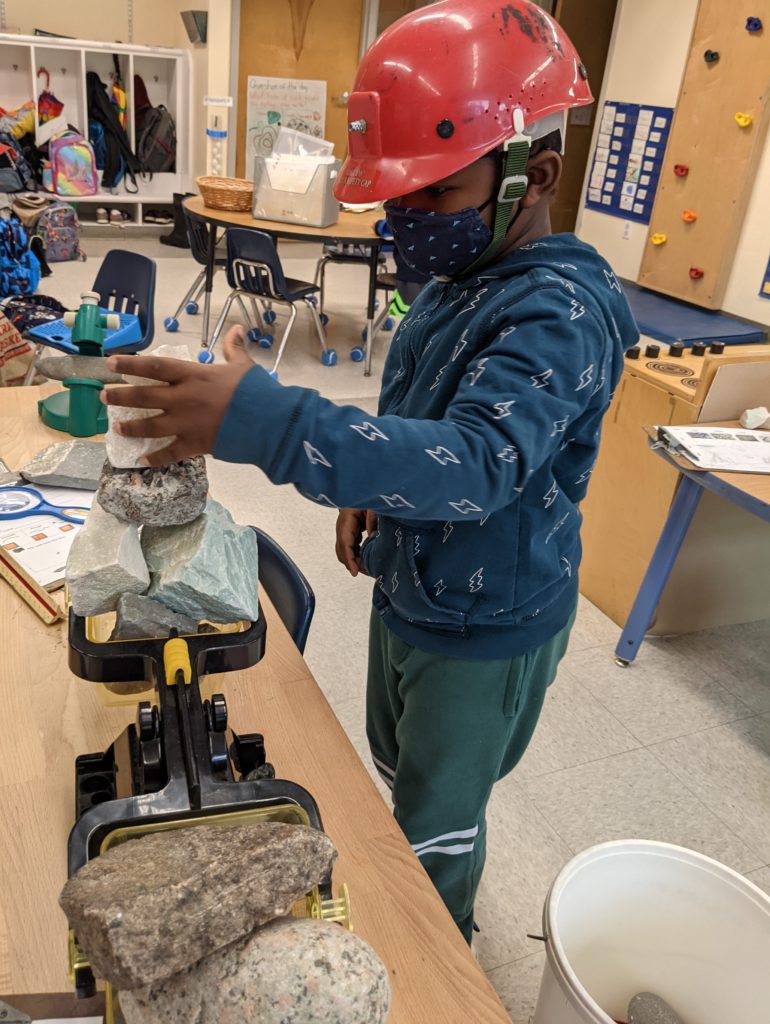Pre-Kindergarten Curriculum
Overview and Highlights
Cambridge Friends School encourages Pre-Kindergarten students to be adventurers, anthropologists, detectives, and scientists as they examine the world around them and integrate their discoveries into what they already know. The early childhood program at Cambridge Friends School is designed to help them learn through multiple channels, including self-directed play, exploration, social interactions, movement, watching others work, listening, and experimenting. Learning by doing and using concrete manipulatives and construction materials support children’s practice of academic skills and concepts as well as their understanding of three-dimensional objects and design.
They are also bursting with energy and their healthy development includes copious amounts of time outdoors and the active use of large and small muscles and coordination. Their time in Pre-Kindergarten encompasses high-energy play as well as small amounts of developmentally appropriate structured school expectations, such as sitting for class meetings and performing classroom jobs.
Literacy
Teachers at Cambridge Friends School organically weave literacy into everyday interactions. For example, throughout the day, students have opportunities for book making, storytelling, reading the “Question of the Day” upon arrival, reading aloud and shared book reading, independent reading, and writing notes for use in play. One student might make signs for their pretend store in the dramatic play area, while another might write a “save” sign to put on a block structure. Myriad dramatic play scenarios presented by teachers or conceived by students provide ample opportunities for teachers to promote reading and writing as tools for communicating ideas. Cambridge Friends School uses the Wilson Language Fundations® Program, teaching and learning direct skills and strategies for building strong readers and writers.
By the end of the school year, these are some of the skills that we expect CFS Pre-Kindergarten students will have developed:
- Identify parts of a book: cover, title and dedication page, author, and illustrator
- Act out stories or events using appropriate language and gestures
- Identify rhyming words
- Use language in imaginative ways
- Use letter-like shapes or symbols to depict words
- Form and recognize most letters of the alphabet
- Show beginning control of writing, drawing, and art tools
- Copy select words from Fundations® and common words from our word wall
Math
Mathematical opportunities are abundant in our Pre-Kindergarten program and we promote a culture of curiosity, exploration, and practical experience. Routine class meeting activities and organic teachable moments provide opportunities to use a calendar, count, add, solve word problems, and organize and display data.
By the end of the school year, these are some of the skills that we expect CFS Pre-Kindergarten students will have developed:
Number Sense and Operations (including algebraic thinking)
- Show curiosity about relationships between numbers and quantities
- Use numerals and pictures to record quantities
- Make one-to-one correspondence and comparisons between groups or objects
Geometry and Measurement
- Identify and describe multiple shapes
- Use mathematical vocabulary when describing volume, size, and quantity
- Sort objects into groups according to a single attribute
- Arrange two or three objects in order by attribute
Data Analysis and Probability
- Refer to time primarily in the present, or in terms of events
- Understand patterns and functions, and fractions and decimals
- Create or follow simple visual or auditory patterns
- Divide materials fairly between two or more people
Social Studies
Social Studies learning at Cambridge Friends School is intertwined with the Quaker Testimonies. Throughout the year, students learn and discuss the themes of Simplicity, Peace, Integrity, Community, Equality, and Stewardship. Students also learn about “People of Inspiration” who exemplify these themes by working to make positive changes in the world currently or in the past. For example, Ruby Bridges is celebrated as a “Person of Inspiration,” and as exemplifying the Testimony of Equality. We highlight what the world and schools were like then, compared to the changes that have been made, and what schools (including our own) are like now. We try to alternate between popular and lesser-known heroes to inform and shine light on important people that the news and history do not typically illuminate.
By the end of the school year, these are some of the skills that we expect CFS Pre-Kindergarten students will have developed:
- Understand the Quaker Testimonies of Community, Stewardship, and Simplicity
- Begin to understand themselves and their impact on others
- Begin to understand how stories have multiple perspectives
Science
Our goal is for each student to build on their natural curiosity and engagement with the physical world around them as they explore a range of topics from each of the four domains of science: life science, physical science, earth/space science, and technology/engineering. This work consists of emergent, student-directed explorations as well as some more structured experiences introduced by teachers such as caring for caterpillars and building and exploring simple machines. As they develop curricular experiences for students, classroom teachers make use of the Next Generation Science Standards (NGSS) and a variety of science curricula, as well as teacher-developed materials and investigations that respond to student interests.
By the end of the school year, these are some of the skills that we expect CFS Pre-Kindergarten students will have developed:
- Able to use senses to observe characteristics and behavior of living and non-living things
- Ask questions about the natural and human made world
- Experiment to discover the properties of materials
- Express an interest in and explore toys, sand, water, sounds, and tools
Art
The visual arts give students the opportunity to simultaneously learn with their hands, brains, eyes, and hearts. From the youngest ages, students build a repertoire of experiences upon which they can draw when they consider and interact with the material world. They develop visual, sensorial, and expressive languages, which they can apply when examining and making things throughout their lives.
By the end of the school year, these are some of the skills that we expect CFS Pre-Kindergarten students will have developed:
- Experiment with the under-over pattern of weaving, and the basic running stitch used for sewing and embroidery
- Build pinch pots and slip and score when joining pieces
- Explore a range of construction strategies including taped recycled materials, papier-mâché, and slotted paper
- Cut symmetrical shapes on a fold
- Create 3D paper sculptures
- Use drawing to communicate ideas from their imaginations
- Focus on line, pattern, and composition in abstract drawings
- Practice mixing primary colors to make secondary colors and other color mixing experiments
- Experiment with layering washes of watercolor to change colors
- Explore a wide range of ways to create a series of patterns, textures, or imagery on paper
Physical Education
Participation in physical activity and kinesthetic learning is critical to a child’s growing sense of self. With the objective of fostering a love of movement for a physically active lifestyle, physical education provides a learning environment for students to connect and learn through movement routines, skills-based activities, games, and sports. Also embedded within the physical education setting are incredible opportunities for students to learn and develop important life skills: resilience, time management, patience, conflict resolution, kindness, determination, and trust.
Students in Pre-Kindergarten are involved in a movement-based curriculum that focuses on strengthening gross motor skills and emphasizes boundaries, spatial awareness, loco-motor patterns, rhythmic movement, yoga, and hand-eye coordination using a multitude of materials (balls, hoops, ribbons, scooters, etc.).
By the end of the school year, these are some of the skills that we expect CFS Pre-Kindergarten students will have developed:
- Demonstrate improved self-confidence
- Improved decision-making skills when participating in partner, small-sided, and large group activities
- Utilize mindful breathing techniques within a Yoga routine
- Develop a foundation for building basic movement and dance routines through skipping, leaping, jumping, and galloping
- Understand boundaries, personal, and general space
- Learn and practice necessary large game skills of rolling, tossing, throwing, kicking, and striking
- Develop cooperation skills with parachute activities providing the building blocks for team building
Music
Throughout the year, students in early childhood music classes engage with music through singing, creative movement, storytelling and dramatization, exploring and playing instruments, listening and composition/improvisation. The musical repertoire presents a variety of genres, reflecting diverse cultural traditions. Intimate performance opportunities offer students space to share their work in a supportive atmosphere at CFS.
Library
Students in the Pre-Kindergarten library classes focus on learning about the library, learning the difference between fiction and nonfiction, learning through stories about school, friendship and conflict resolution, and seasonal/holiday celebrations. Our students are exposed to stories about many cultural, historical, and religious celebrations and observances. and are invited to draw connections/parallels between their own significant celebrations and those of others.
By the end of the school year, these are some of the skills that we expect CFS Pre-Kindergarten students will have developed:
- Identify the morals of stories and the specific community values that a story is reflecting
- Learn to make connections between their own life stories and their work
- Understand significant cultural observances, such as Hispanic Heritage Month, GLBT Book Month™, Banned Book Week, and National Poetry Month
- Begin to know where specific kinds of books are located in the library
- Familiarity with many kinds of books, authors, and illustrators
- A lifelong love of reading


